
Journal of Astronomical History and Heritage
Scope & Guideline
Connecting Celestial Discoveries with Human History
Introduction
Aims and Scopes
- Cultural Astronomy:
The journal emphasizes the study of how different cultures have interpreted celestial phenomena and integrated them into their societal frameworks, including mythology, religion, and art. - Historical Development of Astronomy:
It covers the historical progression of astronomical knowledge, focusing on key figures, institutions, and discoveries that have shaped modern astronomy. - Interdisciplinary Approaches:
The journal encourages interdisciplinary research, blending history, philosophy, literature, and the sciences to provide a holistic understanding of astronomical heritage. - Technological and Instrumental Evolution:
Research on the development and impact of astronomical instruments, observatories, and methodologies is a key focus, highlighting how technology has influenced astronomical discoveries. - Global Perspectives:
The journal promotes a global view of astronomy's history, incorporating studies from various regions and cultures, particularly those that have been historically underrepresented.
Trending and Emerging
- Astrobiology and Extraterrestrial Life:
Research exploring the implications of astrobiology and the search for extraterrestrial life is gaining momentum, reflecting broader societal interests in the cosmos and humanity's place within it. - Cultural Impact of Astronomy:
There is an increasing focus on how astronomy influences culture, literature, and philosophy, examining the interplay between scientific inquiry and cultural expression. - Digital Humanities in Astronomy:
The integration of digital tools and methodologies in the study of astronomical history is emerging, with a rise in projects that digitize historical documents and astronomical data. - Environmental and Climate Studies:
Research connecting astronomy with environmental sciences and climate change is on the rise, particularly in understanding historical celestial events and their impacts on Earth. - Public Engagement and Citizen Science:
A growing interest in the role of public engagement in astronomy, including citizen science initiatives and the democratization of astronomical knowledge, is becoming more prominent.
Declining or Waning
- Astrological Practices:
Research on historical astrological practices has seen a decline, possibly due to a shift towards more empirical and scientific approaches in the study of astronomy. - Geocentric Models:
There is a noticeable decrease in papers addressing the historical geocentric models of the universe, as the journal's focus has shifted more towards heliocentric and modern cosmological frameworks. - Colonial Astronomy:
Studies specifically centered on colonial astronomy, while still relevant, are appearing less frequently, perhaps as the journal broadens its scope to include a wider array of cultural perspectives. - Static Historical Narratives:
There seems to be a waning interest in purely chronological narratives of astronomical history, with a growing preference for thematic and interdisciplinary explorations that connect astronomy with other fields. - Local and National Histories:
The focus on localized or national histories of astronomy is decreasing as the journal increasingly emphasizes global and transnational perspectives.
Similar Journals

Galaxies, published by MDPI, is a premier open-access journal dedicated to the vibrant field of Astronomy and Astrophysics. Established in 2013, with a strong commitment to making scientific research accessible, this journal has quickly garnered recognition, achieving a notable impact factor and ranking in the Q2 Quartile of its category as of 2023. With a Scopus ranking of #31 out of 90 in the domain of Astronomy and Astrophysics, and a commendable percentile rank of 66, Galaxies serves as a vital platform for researchers, professionals, and students engaged in astronomical studies and related fields, facilitating the dissemination and discussion of groundbreaking research. The journal covers a wide array of topics including galactic dynamics, cosmology, and observational astronomy, encouraging interdisciplinary collaboration and innovation within the scientific community. Located in Basel, Switzerland, and adhering to the highest publishing standards, Galaxies is committed to enriching the academic discourse in astronomy, making a significant impact on both current and future explorations of our universe.

PUBLICATIONS OF THE ASTRONOMICAL SOCIETY OF JAPAN
Connecting scholars to the wonders of the universe.Publications of the Astronomical Society of Japan is a prestigious, peer-reviewed journal dedicated to advancing the field of astronomy and astrophysics. Published by Oxford University Press, this journal provides a platform for high-quality research, fostering scientific communication among both established researchers and emerging scholars. With an ISSN of 0004-6264 and E-ISSN 2053-051X, it is recognized for its significant impact in its field, boasting a Q2 ranking in both Astronomy and Astrophysics and Space and Planetary Science as of 2023. The journal seeks to bridge traditional and innovative approaches to expand understanding of celestial phenomena, making it an essential resource for professionals, students, and researchers alike. Researchers can access a wealth of cutting-edge studies spanning theoretical and observational aspects of astronomy from its inception in 1996 to the present day. Although the journal operates under a traditional access model, it remains a respected forum for pivotal discoveries and discussions within the global astronomical community.

Romanian Astronomical Journal
Bridging tradition and innovation in astronomical studies.Welcome to the Romanian Astronomical Journal, a distinguished publication operating under the esteemed EDITURA ACAD ROMANE, dedicated to advancing the field of Astronomy and Astrophysics. With a rich tradition rooted in Romania, this journal aims to foster scholarly discourse and disseminate pivotal research findings within the cosmic sciences. Although currently not designated as Open Access, the journal remains committed to ensuring that its content meets rigorous academic standards. The Romanian Astronomical Journal holds a commendable position in the academic community, achieving a Q3 ranking in Astronomy and Astrophysics and a Q4 ranking in Space and Planetary Science for 2023, reflecting its contribution to the scientific landscape. With a focus on originality and scholarly excellence, this journal serves as a vital resource for researchers, professionals, and students alike, promoting a deeper understanding of the universe and our place within it. Positioned at the intersection of innovative research and practical application, the Romanian Astronomical Journal invites contributions that push the boundaries of knowledge in our field.
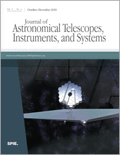
Journal of Astronomical Telescopes Instruments and Systems
Pioneering Discoveries in Astronomy and Optical SciencesJournal of Astronomical Telescopes Instruments and Systems is a prestigious academic journal published by SPIE-SOC PHOTO-OPTICAL INSTRUMENTATION ENGINEERS, focusing on groundbreaking research in the fields of astronomy and astrophysics, instrumentation, and optical sciences. With an ISSN of 2329-4124 and an E-ISSN of 2329-4221, this journal has steadily established its relevance in the scientific community, achieving a respectable Q2 ranking across various important categories, including Astronomy and Astrophysics and Control and Systems Engineering in the year 2023. Spanning research from its inception in 2015 to projections through 2024, the journal continues to serve as a critical platform for disseminating innovative findings that advance our understanding of astronomical instruments and systems. As researchers, professionals, and students seek to stay at the forefront of technological advancements and scientific inquiries, the Journal of Astronomical Telescopes Instruments and Systems is an invaluable resource. The journal provides a valuable venue for peer-reviewed articles that stimulate discussion and drive forward the exploration of astronomical phenomena and instrumentation techniques, making it essential reading for those invested in the future of space sciences.

Journal of High Energy Astrophysics
Illuminating the Universe: Where High Energy Meets DiscoveryThe Journal of High Energy Astrophysics, published by Elsevier, is a premier platform for groundbreaking research in the fields of astrophysics and high-energy phenomena. With an ISSN of 2214-4048 and an E-ISSN of 2214-4056, this journal has quickly established itself as a leader since its inception in 2014. Operating out of the Netherlands, it is recognized for its rigorous peer-review process and high-quality publications, earning an impressive Q1 ranking across multiple domains, including Astronomy and Astrophysics, Nuclear and High Energy Physics, and Space and Planetary Science in 2023. With a Scopus rank of 12 out of 90 in the Astronomy and Astrophysics category, and being positioned in the 87th percentile, the journal plays a pivotal role in disseminating advancements and fostering collaboration among researchers, professionals, and students. Though the journal is not open access, it offers robust subscription options for institutions and individuals seeking to dive into the latest discoveries and theories in high-energy astrophysics.
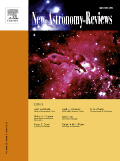
NEW ASTRONOMY REVIEWS
Charting New Realms: Your Source for Distinguished Astronomical ResearchNEW ASTRONOMY REVIEWS, published by Elsevier Science Ltd, stands as a premier journal in the field of Astronomy and Astrophysics as well as Space and Planetary Science. Established in 1998 and operating until 2024, this journal has consistently maintained a distinguished reputation, reflected in its Q1 categorization in both subject areas for 2023. It holds an impressive Scopus ranking, placed #6 out of 104 in Earth and Planetary Sciences and #7 out of 90 in Physics and Astronomy, showcasing its critical impact with a percentile rank of 94th and 92nd, respectively. Although not an open access journal, it provides vital insights and comprehensive reviews that are essential for researchers, professionals, and students eager to advance their knowledge in contemporary astronomical research and theories. With rigorous peer review and a commitment to high-quality publications, NEW ASTRONOMY REVIEWS is an indispensable resource for the scientific community striving to uncover the mysteries of the universe.
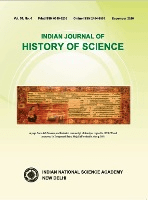
INDIAN JOURNAL OF HISTORY OF SCIENCE
Charting Historical Pathways in Science and TechnologyINDIAN JOURNAL OF HISTORY OF SCIENCE, published by the Indian National Science Academy, offers a vital platform for researchers, professionals, and students dedicated to the exploration of the historical development of science and technology in India and beyond. With the ISSN 0019-5235 and E-ISSN 2454-9991, this peer-reviewed journal aims to promote interdisciplinary collaboration by publishing original research articles, reviews, and discussion papers that highlight the contributions and evolution of scientific thought throughout history. The journal fosters a unique understanding of how historical contexts have shaped current scientific paradigms, making it an essential resource for academic inquiry. Although it does not currently offer Open Access options, the journal's rigorous editorial standards ensure that it maintains a significant impact within the scholarly community, serving as a crucial reference point for historical scholarship in the sciences. Its address in Bahadur Shah Zafar Marg, New Delhi 110 002, India, situates it within a rich tapestry of cultural and academic heritage, further enhancing its significance in the field.
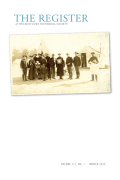
Register of the Kentucky Historical Society
Preserving History, Inspiring Future Generations.The Register of the Kentucky Historical Society is a prestigious journal dedicated to the exploration and documentation of Kentucky's rich historical narrative and cultural heritage. Published by the Kentucky Historical Society, this journal serves as a vital resource for scholars, historians, and enthusiasts engaged in the study of regional history. Although it does not operate under an open access model, it upholds a rigorous approach to academic standards, ensuring high-quality peer-reviewed content. With its ISSN 0023-0243 for print and 2161-0355 for electronic formats, the journal provides a platform for original research articles, critical essays, and book reviews that contribute significantly to the academic discourse regarding Kentucky's history. By prioritizing comprehensive scholarship on the state's past, the Register plays an essential role in fostering a deeper understanding of local heritage, offering invaluable insights to researchers, professionals, and students alike.
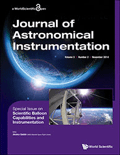
Journal of Astronomical Instrumentation
Unveiling the Universe with Precision InstrumentsThe Journal of Astronomical Instrumentation, published by WORLD SCIENTIFIC PUBL CO PTE LTD, is a pioneering peer-reviewed journal that has established itself as a vital outlet for the dissemination of research in the fields of astronomy and astrophysics, as well as in instrumentation technologies. Since its inception in 2012, this international journal has provided a platform for researchers and practitioners to share their findings, innovations, and insights pertaining to astronomical tools and techniques. With an esteemed Q3 categorization in both Astronomy and Astrophysics and Instrumentation for 2023, it ranks within the top tier of journals in these disciplines, demonstrating its impact and relevance in the scholarly community. Covering a broad range of topics that encompass the design, development, and application of astronomical instruments, the journal also emphasizes technological advancements that enhance observational capabilities. Researchers, professionals, and students alike will find this journal an invaluable resource for staying abreast of current trends and breakthroughs in the field of astronomical instrumentation.

ASTROPHYSICS
Shaping the Future: Essential Research in Astronomy and AstrophysicsASTROPHYSICS, published by Springer/Plenum Publishers, stands as a crucial platform for the dissemination of groundbreaking research in the field of Astronomy and Astrophysics. Established in 1965 and continuing its legacy until 2024, the journal highlights significant advancements, theoretical frameworks, and observational data that collectively push the boundaries of our understanding of the universe. Although currently categorized in the Q4 quartile for Astronomy and Astrophysics and holding a Scopus rank within the 17th percentile, ASTROPHYSICS remains dedicated to offering rigorous peer-reviewed content that is essential for researchers, professionals, and students alike. While it does not provide open access, the journal's accessibility through institutional subscriptions ensures a wide reach among the academic community, allowing it to address the rising curiosity surrounding cosmic phenomena and contribute meaningfully to ongoing scholarly discourse. For those seeking to engage with the latest findings and methodologies in astrophysics, ASTROPHYSICS continues to serve as an indispensable resource.